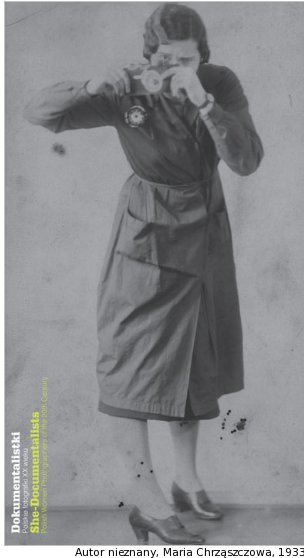She-Documentalists
dal 17/3/2008 al 17/5/2008
Segnalato da
Zofia Chometowska
Julia Pirotte
Irena Jarosinska
Anna Chojnacka
Jadwiga Rubis
Dorota Bilska
Joanna Helander
Anna Beata Bohdziewicz
Anna Brzezinska
Irena Jurkiewicz
Maria Zbaska
Karolina Lewandowska
17/3/2008
She-Documentalists
Zacheta National Gallery of Art, Warsaw
Polish Women Photographers of the 20th Century

curator Karolina Lewandowska
The exhibition She-Documentalists – Polish Women Photographers of the 20th Century emerged with the aim of presenting two fields of photography that have up until now been marginalized by the history of Polish photography: the work of documentary photographers and photography done by women.
Polish documentary photography assumed many different forms and varieties, but has never been systematised. We also know little about women photographers. Even experts in the history of Polish photography can usually mention just a couple of names, whereas history knows dozens of them. The exhibition will present the work of fifty Polish women documentary photographers, but we are aware that the selection represents only a fragment of the phenomenon. Even though most of the featured authors enjoyed recognition, or even fame, in their lifetime, they have by now fallen into oblivion.
The contemporary documentary tendencies in art photography create an incentive to analyse the phenomenon in Polish photography as well. This exhibition constitutes one of the possible historical constructions. In chronological terms, it encompasses the period from the 1870s (to which period date the earliest known non-studio documentary photographs) right up to contemporary documentary-artistic projects that have been so often present in recent years in galleries and museums.
The exhibition’s thematic scope is very broad, but two most significant themes are topographical documentary photography and social report photography. Report photography was always seen as a strongly masculine field, even though it was one to which contributed many outstanding Polish women photographic reporters, such as Zofia Chometowska, Julia Pirotte, Irena Jarosinska, Anna Chojnacka, Jadwiga Rubis and Dorota Bilska whose works will be on show at this exhibition. Among those who are still active today are Joanna Helander, Anna Beata Bohdziewicz, Anna Brzezinska and Irena Jurkiewicz, while Maria Zbaska stands out amongst the younger generation. The exhibition also covers other themes which can be included within the frame of the concept of documentary photography, such as ethnographic and travel photography, amateur photography produced by aristocratic women, patriotic photography, propaganda photography, war photography or report photography as a form of
artistic photography.
Despite its cross-sectional nature, the exhibition is based on radical choices that have made it possible to construct a logical narrative on the subject of documentary photography. Several projects from the turn of the 19th and 20th centuries show the early ties between photography and the illustrated press as well as the medium’s early, purely documentational, functions. The interwar-period projects reflect photography’s ancillary function towards nationalistic ideas, which the exhibition confronts with the rhetoric of communist photography of the early post-war years. The exhibition has been divided into several thematic sections, such as humanistic reportage, which in Poland was inspired chiefly by Steichen’s Family of Man exhibit; photography as witness of history, showing historical turning-point events; and the classic principle of documentary photography – the law of the series (where besides contemporary projects by the Zorka Project duo or Julia Staniszewska we present earlier ones, which for the young-generation documentalists could actually represent a point of reference: Janina Mierzecka’s Working Hand, Elzbieta Tejchman’s Zamieniecka Street, or Zofia Rydet’s
Sociological Record).
Besides original prints and contemporary ones made from original negatives, the exhibition presents picture albums, books and illustrated magazines, in which works by women photographers
were featured.
The exhibition is accompanied by a richly illustrated bilingual Polish-English catalogue, co-published by the BOSZ publishing company, containing over 300 photographs, academic texts on documentary photography, and detailed biographical notes on all of the featured authors.
For further information please contact Olga Gawerska: rzecznik@zacheta.art.pl
main sponsor of the exhibition Efect
sponsors of the Zacheta gallery: Netia, Klima San
sponsors of the opening ceremony A.Blikle, Freixenet
official carrier PLL LOT
media patronage: Gazeta Wyborcza, Polityka, TVP, TOK FM, The Warsaw Voice, Onet.pl, empik
Zacheta National Gallery of Art
Pl. Malachowskiego 3 00-916 Warsaw, Poland
Tues - Sun 12 noon - 8 p.m.



